
Authored by Michael J. DeSantis
Earlier this month, the United States Court of Appeals for the Ninth Circuit recognized that the Federal Arbitration Act (“FAA”) permits mandatory arbitration agreements that are a condition of employment and preempts California law on the issue, a major win for California employers.
Mandatory arbitration agreements used to be the norm in California. Then, in 2019, California enacted Assembly Bill 51 (“AB 51”), which prohibited what the Legislature called “forced arbitration” by making it a criminal offense for an employer to require an existing employee or an applicant to consent to arbitrate specified claims as a condition of employment. Not long after AB 51 went into effect, a district court issued an injunction enjoining enforcement of AB 51, finding that the businesses that were challenging the law were likely to prevail on their argument that AB 51 is preempted by the FAA. However, in September 2021, the Ninth Circuit partially reversed that district court, ruling that (1) AB 51 was enforceable to the extent that it required “consensual” arbitration agreements; and (2) mandatory arbitration agreements that are a condition of employment might not always be “consensual.” The Ninth Circuit later withdrew that opinion, stating that it would rehear the matter after the United States Supreme Court issued a ruling in Viking River Cruises, Inc. v. Moriana (2022) 142 S.Ct. 1906. In June 2022, the United States Supreme Court ruled that the FAA preempts California law and invalidates any law which bars mandatory arbitration of claims asserted under California’s Private Attorneys General Act (“PAGA”).
Earlier this month, the Ninth Circuit issued its final ruling in Chamber of Commerce of the United States of America v. Bonta (2023) — F.4th —- (2023 WL 2013326), which recognized that the United States Supreme Court’s rulings “place it beyond dispute that the FAA was designed to promote arbitration” and includes a “national policy favoring arbitration.” Importantly, the Ninth Circuit also ruled that the FAA preempts state laws that “discriminate against the formation of arbitration agreements.” The Court found that by making it a criminal offense for employers to require arbitration agreements as a condition of employment, AB 51 unlawfully discriminated against the formation of otherwise valid arbitration agreements.
The Court rejected California’s argument that employee arbitration agreements must be “voluntary and consensual,” the same argument that the Ninth Circuit found persuasive prior to Viking River Cruises. Instead, the Court acknowledged that employment agreements often include legal, non-negotiable terms and ruled that “a contract may be ‘consensual,’ as that term is used in contract law, even if one party accepts unfavorable terms due to some degree of unequal bargaining power.”
Chamber of Commerce is the latest illustration of the FAA’s broad application and demonstrates how the United States Supreme Court’s consistent rulings favoring the FAA and arbitration make it difficult for lower courts (including the historically progressive Ninth Circuit) to uphold laws like AB 51.
California employers should note that they can now, again, require their employees and applicants to sign arbitration agreements as a condition of employment. Of course, you should consult with an experienced attorney before implementing mandatory arbitration agreements, as some claims cannot be included in the agreement (e.g., sexual harassment claims). Further, complicated issues can arise if a long-term employee refuses to sign the mandatory arbitration agreement. Plaintiffs’ attorneys will also continue to attack arbitration agreements, so it is imperative to consult with an experienced attorney to ensure that your arbitration agreement is enforceable.
The attorneys at Lobb & Plewe can assist you and your business in implementing a compliant, mandatory arbitration policy. We can also assist in preparing employee handbooks and developing/implementing employee policies to ensure compliance with California’s ever-changing labor laws. When employee disputes arise, we can also defend you and your business against claims for violations of the Labor Code, PAGA claims, etc.
Please contact our office at 866.680.0938 and request to speak with Elaine Rodriguez to schedule an appointment with one of our employment attorneys to discuss your unique situation and how we can help.

